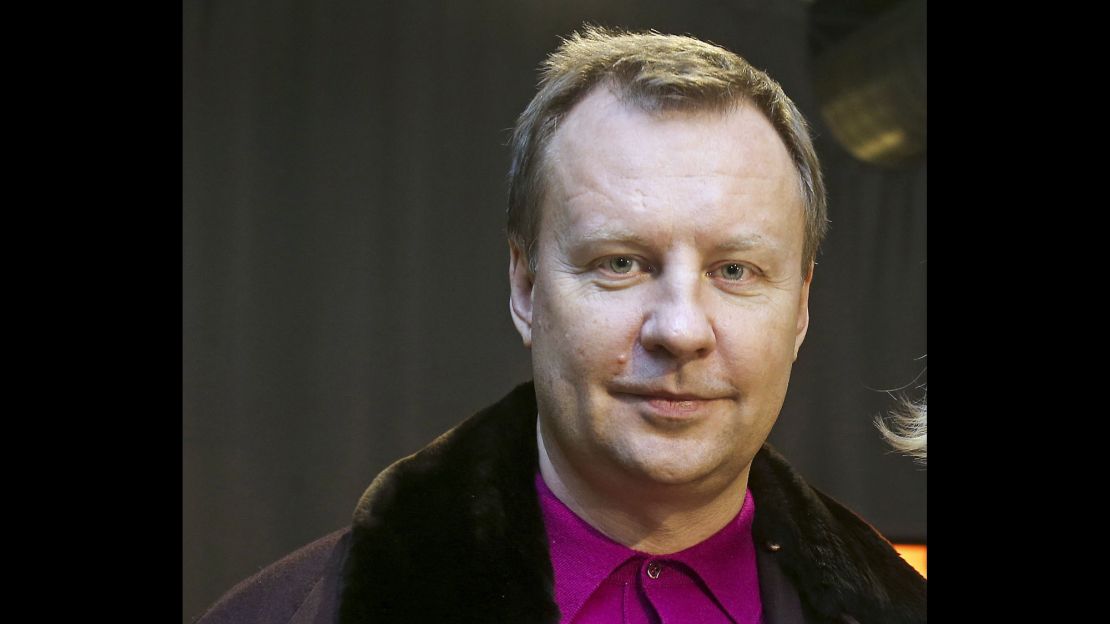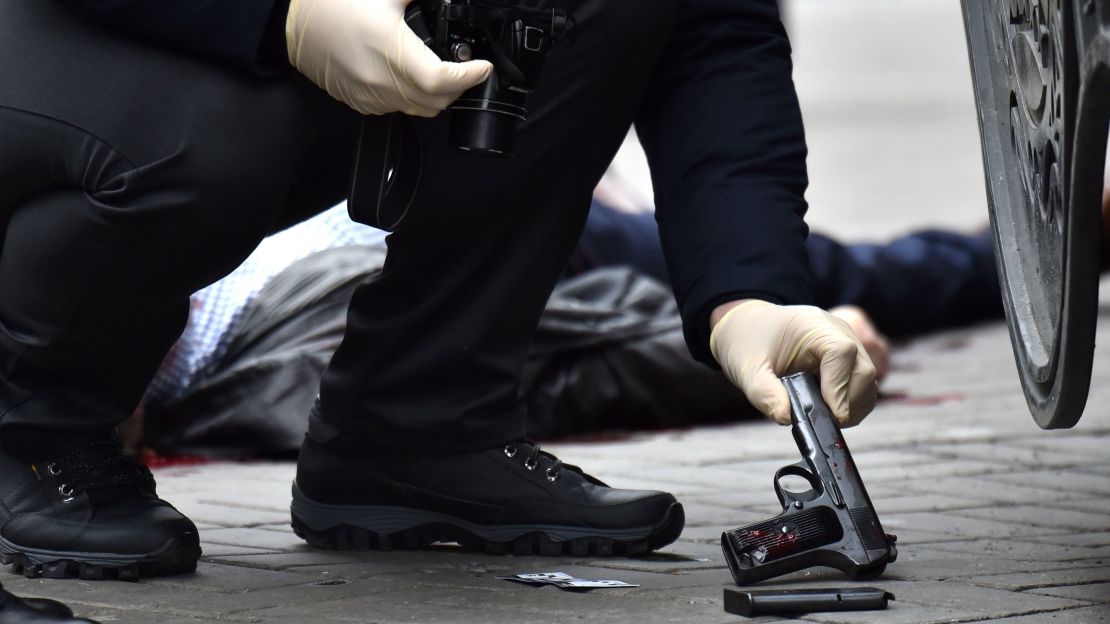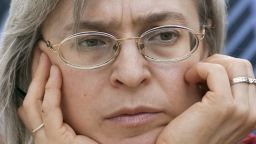Story highlights
NEW: Suspected shooter dies in hospital
Moscow calls claims Russia is behind the killing "absurd"
Voronenkov sharply criticized Russian President Vladimir Putin after leaving Russia for Ukraine
A former Russian lawmaker and Kremlin critic who fled to Ukraine last year was shot dead Thursday in Kiev – a killing that Ukraine’s President called a “Russian state terrorist act.”
Denis Voronenkov, who’d been a Communist member of Russia’s lower legislative house before he left, was fatally shot outside a hotel in broad daylight, officials said.
Voronenkov becomes the latest in a string of Russian critics of President Vladimir Putin and the Russian government who were killed or injured in mysterious circumstances.
The suspect in his death died in the hospital after a shootout with Voronenkov’s bodyguard.

Ukrainian President Petro Poroshenko called Thursday’s killing a “Russian state terrorist act” on Twitter, and described Voronenkov as “one of the key witnesses of the Russian aggression against Ukraine” – referring to Russia’s 2014 annexation of Ukraine’s Crimea region and a subsequent war with pro-Russian rebels.
Poroshenko’s accusation drew a sharp rebuke from Moscow. Any claims that Russia is connected to the killing are “absurd,” Putin spokesman Dmitry Peskov said, according to Russian state-run TASS news agency.
Voronenkov had denounced Russia’s 2014 annexation of Crimea and said he was cooperating with Ukrainian prosecutors’ treason case against former President Viktor Yanukovych, the pro-Russian politician who fled Ukraine after deadly 2014 protests.
Body lies outside hotel
Details about the shooting weren’t immediately released. CNN video shows investigators standing over the bloodied body of Voronenkov, lying face-up on a Kiev sidewalk near the Premier Palace hotel.

The suspect was wounded and taken to a hospital where he later died, Kiev police Chief Andriy Krischenko said.
Details about the suspect’s identity and who injured him weren’t available. No motive for the attack was immediately known.
Ukrainian Prosecutor General Yuri Lutsenko said Voronenkov had given “extremely important testimony” to Ukraine’s military prosecutors.
Voronenkov’s killing was “a demonstrative execution of a witness,” Lutsenko said.
Called annexation of Crimea ‘a mistake’
Voronenkov and his wife, former Russian lawmaker Maria Maksakova, sharply criticized Putin after they left Russia for Ukraine in October.
In a February interview with Radio Free Europe, Voronenkov called Russia’s seizure of Crimea from the Ukraine a “mistake” and “illegal,” and said the couple left the country because of pressure from Russian security services.
Voronenkov also alleged that although he was recorded as having voted for the annexation in Russia’s Duma, the vote was cast against his will. He was not at parliament that day, and another legislator used Voronenkov’s card to vote for him, he told Radio Free Europe.
The day after that interview, Peskov, Putin’s spokesman, denied Voronenkov’s claim.
“I was present at almost every voting and it wasn’t like they (Voronenkov and Maksakova) said,” Peskov said, according to Russia’s state-run Sputnik news service.
Voronenkov said he thought his criticisms led Russian authorities to charge him in absentia with fraud in February, Radio Free Europe reported. He called the charges “fake” and “political,” the report said.
Sputnik news service cast Voronenkov’s departure from the country as an attempt to flee from investigation, citing the Russian Investigative Committee.
Voronenkov said he’d become a Ukrainian citizen. While he was a Communist Party member, his wife had belonged to the ruling United Russia party.
Witness against Yanukovych
Voronenkov also told Radio Free Europe that he was helping Ukrainian prosecutors prepare their case against Yanukovych, who is accused of treason, in part for allegedly facilitating Russia’s annexation of Crimea after he fled Ukraine.
Yanukovych was Ukraine’s President when, in 2013, he suspended talks on what was to be a landmark political and trade deal with the European Union. Russia had opposed Ukraine forming closer ties with the European Union.
Tens of thousands of pro-Western protesters rallied in Kiev against Yanukovych’s decision, and in February 2014, a gunfight between protesters and police left dozens dead. Yanukovych soon fled, eventually for Russia, as his guards abandoned the presidential compound.
Russia’s parliament signed off on Putin’s request to send military forces into Crimea the next month. An uprising by pro-Russian rebels in the eastern Ukrainian regions of Donetsk and Luhansk ensued, a conflict that has left thousands of people dead and injured.
“I told (prosecutors) some details of what was going on. And I will give testimony in open court in the course of judicial inquiry held in Ukraine,” Voronenkov told Radio Free Europe.
Other deaths, injuries of Kremlin critics
Voronenkov is one of several Kremlin critics to die or be injured in mysterious circumstances.
• In 2015, Putin critic Boris Nemtsov, a deputy prime minister in the late 1990s under President Boris Yeltsin, was shot in the back while walking in central Moscow.
Five suspects have been on trial in Moscow since October, with one accused of accepting cash to kill him. All have pleaded not guilty.
Putin blamed extremists and protesters who he said were trying to stir internal strife in Russia. But people close to Nemtsov have expressed concern that he was killed because of his opposition to the government.
• Last month, Nemtsov’s friend, Vladimir Kara-Murza, was in a coma after a suspected poisoning. Kara-Murza is part of Open Russia, an organization of anti-Putin activists who are calling for open elections, a free press and civil rights reforms.
It was the second time in two years Kara-Murza fell into a coma after a suspected poisoning.
• In 2013, Russian businessman Boris Berezovsky was found dead inside his house in Britain with a noose around his neck. His falling-out with the Russian government had left him self-exiled in the United Kingdom.
A coroner’s officer said it couldn’t say whether Berezovsky killed himself. That year, Putin said he could not rule out that foreign secret services had a role in Berezovsky’s death, but he added that there was no evidence of this.
• In July 2009, human rights activist Natalya Estemirova was kidnapped outside her home in the Russian republic of Chechnya and found shot to death in a neighboring republic the same day. She had spent years investigating human rights abuses in Chechnya.
The head of the group Estemirova worked for, Memorial, accused the Kremlin-backed Chechen leadership of ordering her killing. Chechen President Ramzan Kadyrov denied involvement in her death, calling it a “monstrous crime” that was carried out to discredit his government.
• In 2006, Anna Politkovskaya, a journalist critical of Russia’s war in Chechnya, was gunned down at the entrance to her Moscow apartment.
The Kremlin has staunchly denied accusations that it or its agents are targeting political opponents or had anything to do with the deaths.
• Also in 2006, former Russian spy Alexander Litvinenko died a slow death from poisoning in Britain. In a deathbed statement, he blamed Putin for ordering his poisoning by means of the rare radioactive substance polonium-210, saying it was slipped into his tea at a London hotel.
The Kremlin has always strongly denied the accusation, as have the two chief suspects, Andrei Lugovoy and Dmitri Kovtun. But a British inquiry into his death concluded that Putin and the FSB, the KGB’s successor, likely ordered the poisoning.
Journalist Victoria Butenko reported from Ukraine, and CNN’s Jason Hanna wrote in Atlanta. CNN’s Antonia Mortensen, Nick Thompson, Alanne Orjoux, Holly Yan and Catherine E. Shoichet contributed to this report.











